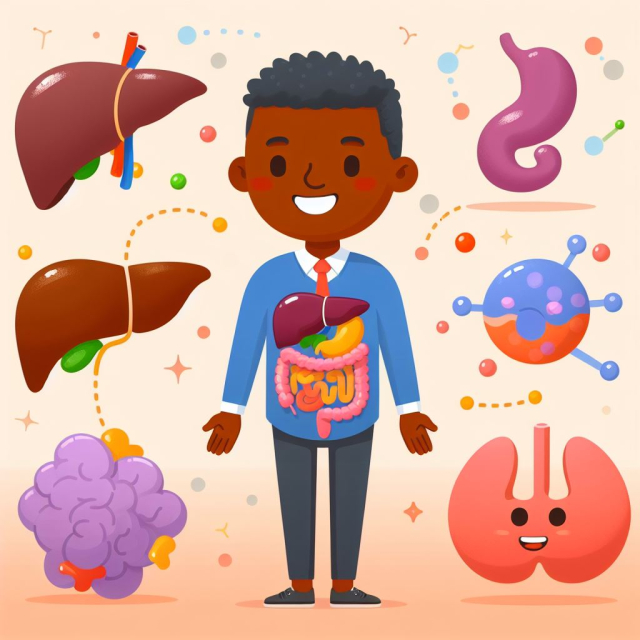Human metabolism is a complex and vital process that occurs in every cell of our body. It is responsible for converting nutrients from food into usable energy, as well as regulating a variety of essential bodily functions to maintain health and well-being. In this article, we will explore in detail what the human metabolism is, the phases it goes through, its main functions and the different types of metabolism that exist.
What is human metabolism?
Human metabolism is a fundamental process that encompasses all the chemical and physical reactions that occur in the body to maintain life. It is an intricate and dynamic system that ranges from the breakdown of the food we consume to the production of energy necessary to carry out vital functions, such as breathing, blood circulation, digestion and tissue repair. Beyond simply being a calorie-burning process, human metabolism is a complex network of biochemical interactions that regulate the balance of nutrients and energy in the body.
Metabolism can be seen as a set of reactions in constant balance, where anabolism builds complex molecules from simple nutrients, while catabolism breaks down complex molecules to release energy. This interplay between anabolism and catabolism is crucial to keeping the body in a state of dynamic balance, adapting to the changing demands of the environment and the body itself.
Metabolism phases:
Human metabolism is divided into two main phases: anabolism and catabolism.
Anabolism:
Anabolism is the phase of metabolism in which complex molecules are built from simpler molecules. During anabolism, nutrients and energy are used to synthesize proteins, nucleic acids, carbohydrates and lipids, which are the fundamental building blocks of the body. Examples of anabolic processes include muscle protein synthesis after exercise and the formation of new cells during tissue growth and repair.
Catabolism:
Catabolism is the phase of metabolism in which complex molecules are broken down into simpler molecules to release energy. During catabolism, nutrients such as carbohydrates, fats, and proteins are broken down into their building blocks, such as glucose, fatty acids, and amino acids, through processes such as cellular respiration and digestion. This released energy is used to fuel vital cellular processes and maintain bodily functions such as heart pumping, muscle contraction, and brain function.
Metabolism functions:
Metabolism plays a variety of important functions in the human body, some of which include:
- Energy Production: Metabolism converts nutrients from food into usable energy in the form of adenosine triphosphate (ATP), which is the primary energy source for all cells in the body.
- Regulation of body weight: Metabolism regulates the amount of energy that is stored in the body as fat, which affects body weight and body mass index (BMI).
- Maintaining body temperature : Metabolism produces heat as a byproduct of energy conversion, which helps maintain body temperature within an optimal range for cellular functioning.
- Protein and nucleic acid synthesis: Anabolic metabolism synthesizes muscle proteins, enzymes and nucleic acids necessary for the growth, repair and maintenance of body tissues.
Types of metabolism:
There are different types of metabolism depending on how the body processes and uses nutrients. Some of the most common types of metabolism include:
- Basal metabolism: Basal metabolism is the amount of energy the body needs to maintain vital functions at rest, such as breathing, blood circulation, and regulating body temperature.
- Aerobic metabolism: Aerobic metabolism uses oxygen to break down nutrients and produce energy in the form of ATP through cellular respiration. This type of metabolism is used during low-intensity, long-duration activities, such as walking or running at a constant pace.
- Anaerobic metabolism: Anaerobic metabolism does not require oxygen and is used during high-intensity, short-duration activities, such as lifting weights or sprinting. It produces energy quickly, but also generates lactic acid as a byproduct, which can cause muscle fatigue and discomfort.
- Glucose metabolism: Glucose metabolism is the process by which the body breaks down and uses glucose, the main fuel for cells, to produce energy in the form of ATP.
- Fat metabolism: Fat metabolism involves the breakdown of fatty acids stored in adipose tissue to produce energy when glucose levels are low, such as during fasting or prolonged exercise.
- Protein metabolism: Protein metabolism involves the breakdown of proteins into amino acids, which are then used to synthesize new proteins or to produce energy when other energy substrates are limited.
Human metabolism is a dynamic and essential process that regulates energy and nutrients in the body to maintain life and health. Through its various phases and functions, metabolism ensures the proper balance of nutrients and energy for the optimal functioning of all bodily functions. Understanding how metabolism works and how it affects our health can be key to maintaining a healthy and active lifestyle throughout life.






